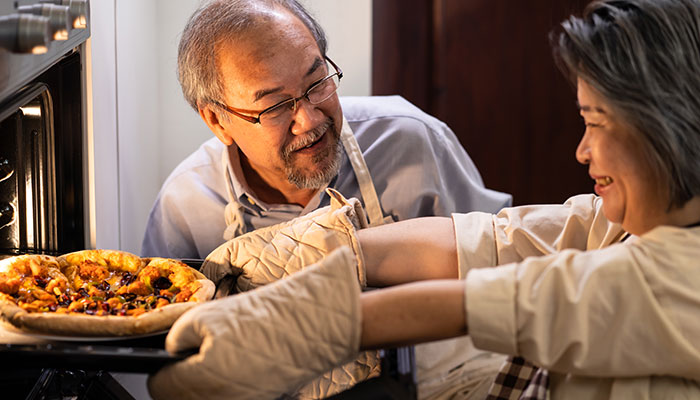Aging Well Syracuse
Helpful tips for family caregivers
February/March 2009
In this February/March issue:
The healing power of a life review
In the years beyond child rearing and work, it’s easy for a person to lose a sense of identity, especially when confronted with a serious illness. If your loved one is looking aimless or “down,” consider helping him or her with a life review.
A life review is just as it sounds: an opportunity to tell one’s history—to celebrate accomplishments and milestones while reflecting on past difficulties or even unresolved relationships. A life review may prompt new feelings of self-acceptance or motivate resolution and the healing of long-standing hurts. During the review process, many people find new satisfaction and meaning.
You can initiate a life review:
- Ask questions that get thoughts and memories rolling—you can take notes as your loved one reminisces out loud. Or, offer a journal or provide a tape recorder.
- Listen carefully and without judgment. Let your loved one come to his or her own conclusions about life. This is not a time to work through past conflicts.
- Accept the inconsistencies—accuracy is not the goal and not everything is remembered equally.
Some good questions to ask:
- What was it like when you were a child?
- What are your favorite memories as a teenager? As a young adult? In middle age?
- What are you most proud of in your life?
- If you could do it over again, what would you do differently?
A life review is a great project to do together and a chance to become closer. It is also an excellent opportunity to engage in personal growth and positive insight at a time when physical abilities may be extremely limited.
Return to topBurn and fire safety
 Persons over age 65 are 2.6 times more likely than the general population to die in a home fire. That’s alarming!
Persons over age 65 are 2.6 times more likely than the general population to die in a home fire. That’s alarming!
Older adults most often incur burns at home, typically when cooking or bathing. The most common burn injuries are from scalding hot water or flames.
Many factors contribute to an older adult’s high susceptibility to burns:
- Diminished sense of hearing, sight, and smell. They may not hear a smoke detector, see a spark, or smell a gas leak.
- Slowed or limited ability to move around. They may not be able to exit quickly when in danger.
- Fragile skin. With such a thin protective layer, they are more vulnerable to heat.
- Medications that cause drowsiness. Drugs that lead to drowsiness and slow reaction times put your loved one at greater risk.
Here are some safety tips for preventing burns:
Kitchen
This is the room where burns most commonly occur.
- Stay in the kitchen when cooking. It’s too easy to forget and leave a burner on when leaving a room. Alternatively, set a loud timer that will keep going until it’s turned off.
- Avoid loose, long sleeves when cooking. Instead, wear snug sleeves or short-sleeved or sleeveless tops.
- Use mitts when lifting hot pans or casseroles.
- Put a pan lid on a stovetop fire to rob it of oxygen.
- Cook using a microwave oven.
Electrical fires
- Repair frayed wires.
- Don’t overload power strips or outlets.
- Use only one appliance per outlet.
- Use extension cords for short-term needs. They are not meant as a permanent solution.
- Use heating pads with a timer. Do not sleep with heating pads turned on.
- Leave three feet of space around a space heater and shut it off when the last person exits the room.
Smoking-related
- Do not smoke in bed.
- When drowsy, put out the cigarette or smoke outside.
- Never smoke while oxygen is in use. Leave the tank indoors and go outside to smoke.
- Use cans filled with sand or large ashtrays to douse cigarettes.
Miscellaneous
- Turn the water heater to 120–125 degrees Fahrenheit.
- Check the smoke detector regularly.
- If your loved one is hard of hearing, install a smoke detector that also flashes light. In the bedroom consider one that vibrates a pad that can be placed under the pillow.
Caring for your marriage, also
 With Valentine’s Day on the horizon, it’s a good time to consider strategies to prevent your partner from getting overlooked because of your caregiving.
With Valentine’s Day on the horizon, it’s a good time to consider strategies to prevent your partner from getting overlooked because of your caregiving.
Caring for an aging relative definitely affects your ability to nurture your significant other.
A poll at caregiving.com revealed that 81% of family caregivers say caregiving tested their marriage in ways they never imagined.
In that light, we draw upon suggestions of family caregivers and the research of noted couples counselor Dr. John Gottman to suggest ways to maintain the health of your marriage as you care for the health of your aging loved one.
Communication
- Review family values and goals. Establish a sense of shared purpose. How does eldercare fit with your values? Having a shared vision makes it easier to accept inconveniences.
- Discuss fears, concerns, and expectations. You and your partner may have strong memories and assumptions based on watching your parents care for—or not care for—your grandparents.
- Show interest when your partner shows signs of stress. Demonstrate that his or her emotional and physical needs are also a priority.
- Stay positive. Even when there are problems between you, notice and point out the good things.
Time together
- Set aside time for your partner. Whether it’s a walk, a movie, a weekend away, make sure to have fun together. Consider date nights, just the two of you.
- Make it quality time. Pay attention to your partner. Be “present” for your moments together. No talking about your caregiving!
- Avoid discussion of marital problems. Separate your problem-solving time from time together spent nurturing your relationship.
This Valentine’s Day consider starting a tradition of getting together weekly, just the two of you, for some light fun. Help yourselves remember why you became a couple in the first place.
Return to top
